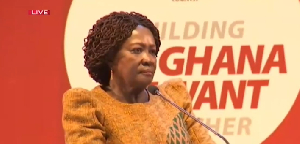Opinions of Monday, 23 June 2014
Columnist: Okoampa-Ahoofe, Kwame
One Lesson from June 4th - Part 1
By Kwame Okoampa-Ahoofe, Jr., Ph.D.
During the 35th anniversary of the infamous June 4th Uprising, Maj. (Rtd.) Kwadwo Boakye-Djan (I am quite certain that he has an English, "Christian" baptismal name hiding somewhere on a certificate in his closet or drawer somewhere) was widely reported to have asserted that his former bloody buddy and mutiny leader, Flt.-Lt. Jerry John Rawlings, was suffering from an unspecified form of dementia. We wish we could report that Maj. Boakye-Djan were any mentally and/or cognitively healthier than his former AFRC-era boss, but we cannot.
In fact, what those of us avid students and observers of the post-June 4th Ghanaian political culture can boldly and frankly say with confidence, is that almost each and every key player of that "revolution" is afflicted with some form of clinical dementia today. First of all, the forcible and populist freezing of commodity prices on many a Ghanaian food market led to the effective collapse of the hitherto fragile national economy. This was because most of the so-called essential commodities involved in such price freeze were imported from abroad. And it is this abject lack of appreciation of the economic forces at work that makes Mr. Rawlings' recent faulting of the currency redenomination exercise, under President Kufuor's tenure, for having wrecked Ghana's economy seem at once rather bizarre and farcical.
Of course, we are well aware of the fact of such warped perspective being squarely predicated on the June 4th faux-philosophy of scapegoating those who have contributed far more constructively to the development of Ghana's economy and have, therefore, become a primary source of envy and bitterness of Mr. Rawlings. Of course, he has every right to hate the guts of former President John Agyekum-Kufuor, but Togbui Avaklasu has absolutely no moral or practical reason to presume a status of political coequality with his former Secretary for Local Government.
Where he created the Rawlings necklace, for example, President Kufuor expanded the national economy more than four-fold. If this is what he means by the wrecking of Ghana's economy, then Togbui Avaklasu had better compare notes with Dr. Kwabena Dufuor, Finance Minister of his own National Democratic Congress government under the late President John Evans Atta-Mills, and the World Bank. And as one Ghanaweb.com commentator aptly suggested in the wake of his most unfortunate June 4th remark, if Mr. Rawlings thinks that counting the purchasing price of a piece of women's underwear in millions of cedis is a vintage mark of "revolutionary" progress, then the bloodiest Ghanaian strongman in recent memory had better check himself into a mental rehab center.
I also have my own misgivings about some critical aspects of Mr. Kufuor's post-presidential decisions, but these have absolutely nothing, whatsoever, to do with his unbested managerial style as President of the august Republic of Ghana. Except for the shortlived administration of the country by the immortalized Prime Minister Kofi Abrefa Busia, of course. I also don't know precisely what he means, when Maj. Boakye-Djan makes the following observation vis-a-vis the June 4th mutiny: "We rose up in 1979 to enforce our laws that had been broken in 1966 and 1972 with impunity. These laws, starting from the Criminal Code of 1960, Section 12, have been codified under the 1992 Constitution and are, therefore, still in force. We, therefore, committed no wrong in holding to account all those who had broken them."
Well, 1966 obviously refers to the military overthrow of the Nkrumah-led government of the Convention People's Party (CPP), by the Kotoka-led junta of the National Liberation Council (NLC). We also know that by 1966, President Nkrumah had cavalierly violated the most salient tenet of Ghana's 1957 Westminster-oriented Constitution by declaring himself to be the country's President-for-Life. Is the former spokesperson for the so-called Armed Forces Revolutionary Council, therefore, saying that the yeomanly ousting and re-democratization of Ghana's political culture in 1969 inexcusably violated the rule of law in a civilized, or even an emergent but decidedly civilized political culture like Ghana's in 1966?
If he is on a doctor-prescribed medication, then it is quite clear that at the time that he made the remarks widely attributed to him, Maj. Boakye-Djan had either run out of his prescription drugs or he had forgotten to take them. And so he may do himself and the rest of us quite some good by going back to his medicince cabinet for his pills, popping them, and then waiting for at least an hour, for his medication to work their expected and desired wonders on his brain cells; and then come back to clarify for us further, just why he would presume Kotoka, Ankrah and Afrifa to have grossly erred in uprooting the malignant tumor that was the Convention People's Party regime, and replacing the latter with a more politically and culturally conducive democratic system of governance.
__________________________________________________________
*Kwame Okoampa-Ahoofe, Jr., Ph.D.
Department of English
Nassau Community College of SUNY
Garden City, New York
Board Member, The Nassau Review
June 8, 2014
E-mail: okoampaahoofe@optimum.net
###











